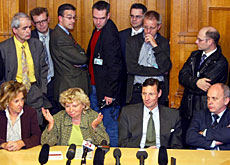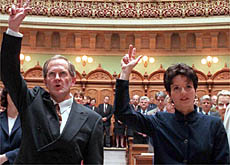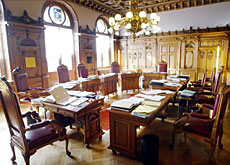Parties manoeuvre in cabinet election

Following the gains it made in October’s parliamentary elections, the rightwing Swiss People’s Party is demanding a second cabinet seat.
But the other three parties in government, unwilling to give up one of their seats voluntarily, are negotiating to find a solution.
The composition of the seven-strong cabinet has remained the same since 1959, thanks to an informal power-sharing arrangement known as the “Magic Formula”.
When it was introduced, it divided the cabinet seats among Switzerland’s four main political parties according to the linguistic and political landscape of the time.
The centre-right Christian Democrats and Radicals both have two seats, as does the centre-left Social Democratic Party. The People’s Party, which is now the largest in parliament, has just one seat.
Attack
Immediately after the October elections, the People’s Party went on the attack.
It announced it wanted a second cabinet seat at the expense of the Christian Democrats, and put forward the party’s controversial driving force, Christoph Blocher, as its official candidate.
The party also said that unless Blocher were elected, it would withdraw from government by calling on its existing minister, Samuel Schmid, to resign and go into opposition.
But not everyone in the party agrees with the strategy, which would signal the end of the Magic Formula.
Schmid himself has said that he is not prepared to have his destiny linked with Blocher’s.
Although the two Christian Democrats ministers, Ruth Metzler and Joseph Deiss, are most at risk of losing their job, the People’s Party has not ruled out other possible scenarios.
He has also said that he might stand against one of the Social Democrat ministers – Micheline Calmy-Rey – if he is unsuccessful in unseating either of the Christian Democrats.
Defence
Attacked on several fronts, the Christian Democrats are stubbornly refusing to accept a purely arithmetical interpretation of October’s elections – which left them as the smallest of the four parties in government with just 14.4 per cent of the vote.
The party has gone on the offensive, proposing that the Radical forfeit the seat being vacated by Kaspar Villiger, who has announced that he will be stepping down at the end of this year.
The Christian Democrats also argue that the Right, Left and Centre should all be equally represented in the government. Party leaders claim it would be the only way of guaranteeing the future of Switzerland’s system of cooperation and consensus in government.
They insist that the balance of power would shift too far to the Right if both the People’s Party and the Radicals had two cabinet seats.
But not all Christian Democrat parliamentarians are towing the party’s official line.
Carlo Schmid, a Christian Democrat member of the Senate, has publicly said that the party should give up one of its seats to the People’s Party.
Given their internal differences, even an alliance with the Social Democrats – who want to keep Blocher out of the government – might not be sufficient for the Christian Democrats to hold on to its two seats.
Opposition
The other major losers in October’s elections, the Radicals, have been making overtures to the People’s Party, and support its calls for a second seat.
Not surprisingly, they reject the proposal from the Christian Democrats that Villiger’s vacant seat be offered to the People’s Party.
Blocher has also repeatedly said he would not run against any candidates put forward by the Radicals.
In principle, the Social Democrats are not against the People’s Party being given a second seat, although the party has objected to Blocher as a candidate.
The Social Democrats are not in principle against the SVP being given a second seat. Their objection is to Blocher as candidate.
One suggestion that has sparked media interest in Switzerland is that the Social Democrats and the Greens might join forces with the Christian Democrats to prevent Blocher’s election and force the People’s Party into opposition.
The Greens are opposed to both Blocher entering government.
The Greens have proposed that if Schmid were to resign from the government, they should be awarded the seat instead.
swissinfo, Doris Lucini
There are 246 members of parliament, with 124 votes required for an absolute majority.
Neither of the main political blocs – People’s Party/Radicals or Christian Democrats/Social Democrats/Greens – can command a majority in Parliament.
The People’s Party is demanding a second seat in government for its candidate, Christoph Blocher; otherwise it will go into opposition.
Share of vote in October’s elections: People’s Party – 26.6%, Social Democrats – 23.3%, Radicals – 17.3%, Christian Democrats – 14.4%.

In compliance with the JTI standards
More: SWI swissinfo.ch certified by the Journalism Trust Initiative


You can find an overview of ongoing debates with our journalists here. Please join us!
If you want to start a conversation about a topic raised in this article or want to report factual errors, email us at english@swissinfo.ch.